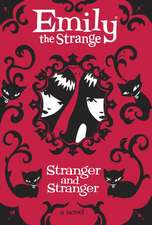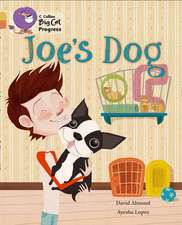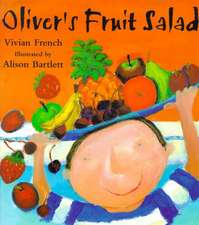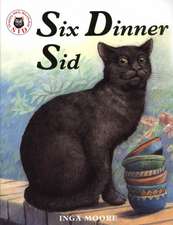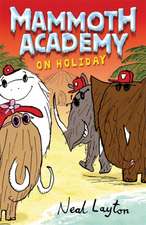Clay
Autor David Almonden Limba Engleză Paperback – 29 feb 2008 – vârsta de la 12 ani
Vezi toate premiile Carte premiată
Carnegie Medal (2005), Costa Book Awards (2006)
Stephen’s a gifted sculptor. One day as Davie looks on, Stephen brings a tiny figure to life. It’s a talent he has, the gift of creation—and he knows that Davie has this talent, too. Davie allows Stephen to convince him to help bring a life-size figure to life—and Clay is born. Clay is innocent, but Stephen has special plans for him.
What has Davie helped to unleash on the world?
From the Hardcover edition.
| Toate formatele și edițiile | Preț | Express |
|---|---|---|
| Paperback (2) | 20.02 lei 3-5 săpt. | +41.58 lei 7-13 zile |
| Hachette Children's Group – 3 oct 2013 | 20.02 lei 3-5 săpt. | +41.58 lei 7-13 zile |
| Delacorte Press Books for Young Readers – 29 feb 2008 | 77.73 lei 3-5 săpt. |
Preț: 77.73 lei
Nou
Puncte Express: 117
Preț estimativ în valută:
14.87€ • 15.57$ • 12.31£
14.87€ • 15.57$ • 12.31£
Carte disponibilă
Livrare economică 15-29 martie
Preluare comenzi: 021 569.72.76
Specificații
ISBN-13: 9780440420132
ISBN-10: 044042013X
Pagini: 247
Dimensiuni: 133 x 203 x 15 mm
Greutate: 0.25 kg
Editura: Delacorte Press Books for Young Readers
ISBN-10: 044042013X
Pagini: 247
Dimensiuni: 133 x 203 x 15 mm
Greutate: 0.25 kg
Editura: Delacorte Press Books for Young Readers
Notă biografică
David Almond lives in England with his partner and their daughter.
Extras
one
He arrived in Felling on a bright and icy February morning. Not so long ago, but it was a different age. I was with Geordie Craggs, like I always was back then. We were swaggering along like always, laughing and joking like always. We passed a Players back and forward between us and blew long strings of smoke into the air. We'd just been on the altar. We were heading for Braddock's garden. We were on Watermill Lane when a red taxi rattled past us. Black fumes belched from it. The sign at the top said it was from down at the coast.
"What's that doing up here?" said Geordie.
A bit of communion wafer was still stuck to my teeth. I poked it free with my tongue and swallowed it, then drew on the cigarette again.
"God knows," I said.
The taxi stopped fifty yards away, outside Crazy Mary's house. Crazy came lolloping out with her red hair flying. She had a big flappy flowery dress and tartan slippers on. The kid got out of the taxi. He pulled a battered brown suitcase after him. Crazy paid the driver; then the two of them headed for her front door. She looked back at us. She tried to put her arm around the kid but he twisted away and went inside. Crazy followed him and the door slammed shut.
The taxi driver leaned out of his window as he went past.
"What you two nebbing at?" he said.
"Nowt much," I said.
"Why don't you nick off back to Whitley Bay?" said Geordie.
"Aye," I said. "Nick off, Fishface."
And we laughed and belted on towards the garden yelling, "Fishface! Fishface! Fishface!"
We went through the ancient iron gate, ducked through the thorns, splashed through the edge of the clay pond, went into the quarry, went into the cave. There was writing on the wall again. We held matches up to it. All it said was 'We're watching you. Your doomd,' then a big black X. Somebody had tried to draw a skull as well but it looked like they'd given up because they were too useless.
I wiped dirt over it all.
Geordie sharpened his knife on a stone.
He pointed it at me.
"Soon there'll be a proper battle," he said.
"Aye," I said.
"It'll be just them and us," he said.
I shivered. I tried to laugh.
"The Battle of Braddock's Garden," I said.
I looked out at the sheer craggy quarry walls, the thick weeds, the deep clay pond, the ruins of Braddock's house above. The sparrow hawk flew out from its stony nest and flapped up into the open sky.
"Who was that at Crazy's?" I said.
He shrugged.
"God knows," he said. "Wouldn't like to be him, though, holed up with that loony."
He took a syrup of figs bottle out of his pocket and lobbed it over. It was half full of the wine that he'd stolen after Mass that morning. I screwed the top off and swigged and smacked my lips. The wine was sticky and sweet and you could soon feel the little bit of dreaminess it brought.
"Pinching altar wine's a sin," I said.
We laughed and snapped some sticks, getting a fire ready.
I pointed to the ground.
"You'll burn in Hell, George Craggs," I said.
"Naa," said Geordie. "Not for that. You go to Hell for proper sins. Like nicking a million quid."
"Or killing somebody," I said.
"Aye." He stabbed the knife into the ground. "Murder!" He swigged the wine and swiped his hand across his lips. "I dreamed I killed Mouldy the other night."
"Did you?"
"Aye."
"Was there loads of blood?"
"Gallons. Blood and guts everywhere."
"Great!"
"I did it here. I stabbed him in the heart, then I chopped his head off and I hoyed it in the pond."
We giggled.
"Prob'ly that'd not be a sin at all," I said. "Prob'ly you'd go straight to Heaven for getting rid of a thing like Mouldy."
"Course you would," said Geordie. "The whole world'd be better off without things like Mouldy."
"Aye."
We were quiet while we thought of Mouldy. We listened to the noises in the quarry.
"You seen how big he's getting?" I said.
"Aye."
"Bliddy Hell," I whispered.
"Aye. Bliddy Hell. He's turning to a monster."
two
There was no mystery. It turned out the kid was called Stephen Rose. He was from Whitley Bay. He was just a bit older than us. The story was he'd gone away to Bennett College to train to be a priest. He went when he was eleven, which wasn't strange back then in the 1960s. We knew loads of lads that did it. Like lots of them, though, Stephen couldn't stand it and he came back out again two or three years later. He'd just been home a month when his dad dropped dead with a stroke. Then his mother went mad and was taken away in the middle of a stormy night to Prudhoe. Stephen was all alone. The Poor Clares were going to take him in; then somehow they found out there was a distant aunt, Crazy Mary, up here in Felling, and so he came to her. The plan was that his mother'd be out soon, they'd set up home down at the coast again, everything would settle down again. But when I heard my parents on about it, it seemed there wouldn't be much chance of that. They'd heard she was truly barmy. She'd gone way way round the bend.
"Worse than Crazy Mary?" I said.
Mam glared at me.
"Don't call the poor woman that," she said. "She's just a devout and troubled soul."
"Sorry," I said.
"You don't know how lucky you are," she said. "There but for the grace of God . . ."
"What?" I groaned. "You worried about my sanity, Mother?"
I twisted my mouth and stuck my tongue out and drooled.
"Stop it!" she snapped. "Don't tempt fate."
She crossed herself.
"Maybe we should call her Holy Mary," she said. "Have you seen anybody else so devout, anybody else that prays so hard, anybody else so filled with yearning?"
I shook my head.
"Well, then," she said. "Did you know there's stories that there's saints in Mary's past?"
"Saints?"
"Way back in her family. Back in Ireland, where the Doonans came from long ago."
Dad laughed.
"In the olden days," he said, "when saints walked in every village and an angel sat in every tree."
From the Hardcover edition.
He arrived in Felling on a bright and icy February morning. Not so long ago, but it was a different age. I was with Geordie Craggs, like I always was back then. We were swaggering along like always, laughing and joking like always. We passed a Players back and forward between us and blew long strings of smoke into the air. We'd just been on the altar. We were heading for Braddock's garden. We were on Watermill Lane when a red taxi rattled past us. Black fumes belched from it. The sign at the top said it was from down at the coast.
"What's that doing up here?" said Geordie.
A bit of communion wafer was still stuck to my teeth. I poked it free with my tongue and swallowed it, then drew on the cigarette again.
"God knows," I said.
The taxi stopped fifty yards away, outside Crazy Mary's house. Crazy came lolloping out with her red hair flying. She had a big flappy flowery dress and tartan slippers on. The kid got out of the taxi. He pulled a battered brown suitcase after him. Crazy paid the driver; then the two of them headed for her front door. She looked back at us. She tried to put her arm around the kid but he twisted away and went inside. Crazy followed him and the door slammed shut.
The taxi driver leaned out of his window as he went past.
"What you two nebbing at?" he said.
"Nowt much," I said.
"Why don't you nick off back to Whitley Bay?" said Geordie.
"Aye," I said. "Nick off, Fishface."
And we laughed and belted on towards the garden yelling, "Fishface! Fishface! Fishface!"
We went through the ancient iron gate, ducked through the thorns, splashed through the edge of the clay pond, went into the quarry, went into the cave. There was writing on the wall again. We held matches up to it. All it said was 'We're watching you. Your doomd,' then a big black X. Somebody had tried to draw a skull as well but it looked like they'd given up because they were too useless.
I wiped dirt over it all.
Geordie sharpened his knife on a stone.
He pointed it at me.
"Soon there'll be a proper battle," he said.
"Aye," I said.
"It'll be just them and us," he said.
I shivered. I tried to laugh.
"The Battle of Braddock's Garden," I said.
I looked out at the sheer craggy quarry walls, the thick weeds, the deep clay pond, the ruins of Braddock's house above. The sparrow hawk flew out from its stony nest and flapped up into the open sky.
"Who was that at Crazy's?" I said.
He shrugged.
"God knows," he said. "Wouldn't like to be him, though, holed up with that loony."
He took a syrup of figs bottle out of his pocket and lobbed it over. It was half full of the wine that he'd stolen after Mass that morning. I screwed the top off and swigged and smacked my lips. The wine was sticky and sweet and you could soon feel the little bit of dreaminess it brought.
"Pinching altar wine's a sin," I said.
We laughed and snapped some sticks, getting a fire ready.
I pointed to the ground.
"You'll burn in Hell, George Craggs," I said.
"Naa," said Geordie. "Not for that. You go to Hell for proper sins. Like nicking a million quid."
"Or killing somebody," I said.
"Aye." He stabbed the knife into the ground. "Murder!" He swigged the wine and swiped his hand across his lips. "I dreamed I killed Mouldy the other night."
"Did you?"
"Aye."
"Was there loads of blood?"
"Gallons. Blood and guts everywhere."
"Great!"
"I did it here. I stabbed him in the heart, then I chopped his head off and I hoyed it in the pond."
We giggled.
"Prob'ly that'd not be a sin at all," I said. "Prob'ly you'd go straight to Heaven for getting rid of a thing like Mouldy."
"Course you would," said Geordie. "The whole world'd be better off without things like Mouldy."
"Aye."
We were quiet while we thought of Mouldy. We listened to the noises in the quarry.
"You seen how big he's getting?" I said.
"Aye."
"Bliddy Hell," I whispered.
"Aye. Bliddy Hell. He's turning to a monster."
two
There was no mystery. It turned out the kid was called Stephen Rose. He was from Whitley Bay. He was just a bit older than us. The story was he'd gone away to Bennett College to train to be a priest. He went when he was eleven, which wasn't strange back then in the 1960s. We knew loads of lads that did it. Like lots of them, though, Stephen couldn't stand it and he came back out again two or three years later. He'd just been home a month when his dad dropped dead with a stroke. Then his mother went mad and was taken away in the middle of a stormy night to Prudhoe. Stephen was all alone. The Poor Clares were going to take him in; then somehow they found out there was a distant aunt, Crazy Mary, up here in Felling, and so he came to her. The plan was that his mother'd be out soon, they'd set up home down at the coast again, everything would settle down again. But when I heard my parents on about it, it seemed there wouldn't be much chance of that. They'd heard she was truly barmy. She'd gone way way round the bend.
"Worse than Crazy Mary?" I said.
Mam glared at me.
"Don't call the poor woman that," she said. "She's just a devout and troubled soul."
"Sorry," I said.
"You don't know how lucky you are," she said. "There but for the grace of God . . ."
"What?" I groaned. "You worried about my sanity, Mother?"
I twisted my mouth and stuck my tongue out and drooled.
"Stop it!" she snapped. "Don't tempt fate."
She crossed herself.
"Maybe we should call her Holy Mary," she said. "Have you seen anybody else so devout, anybody else that prays so hard, anybody else so filled with yearning?"
I shook my head.
"Well, then," she said. "Did you know there's stories that there's saints in Mary's past?"
"Saints?"
"Way back in her family. Back in Ireland, where the Doonans came from long ago."
Dad laughed.
"In the olden days," he said, "when saints walked in every village and an angel sat in every tree."
From the Hardcover edition.
Recenzii
“[A] decidedly creepy musing on the nexus between faith and reality, good
and evil, from a master.”–The Horn Book Magazine, Starred
“Readers will remain on the edge of their seats to find out if the good in David can overcome unleashed evil.”–Publishers Weekly, Starred
and evil, from a master.”–The Horn Book Magazine, Starred
“Readers will remain on the edge of their seats to find out if the good in David can overcome unleashed evil.”–Publishers Weekly, Starred
Descriere
Printz Award-winner Almond presents a remarkable novel about creation. One day, as Davie looks on, Stephen brings a tiny clay figure to life. What has Davie helped unleash on the world?
Premii
- Carnegie Medal Nominee, 2005
- Costa Book Awards Nominee, 2006

